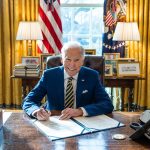President-elect Donald Trump, the billionaire business mogul, continues to possess an undeniable charm for blue-collar Americans that helped him clinch victory in a highly contested election. Now, as he gears up for what some might call a “second chance” at the White House, Trump finds himself navigating the tricky waters of governance, attempting to appease a broad coalition with diverging interests.
Two significant challenges for Trump are already surfacing before he even steps foot back into the Oval Office. Congressional Republicans, including key figures like House Ways and Means Chairman Jason Smith and Senate Majority Leader-elect John Thune, are diving head-first into tax reform discussions—though a consensus on strategy seems about as far off as a bipartisan agreement in Washington. Trump’s proclamation to slash taxes even further seems aimed at keeping both his billionaire pals and his working-class supporters happy, although how that will play out remains to be seen.
During an interview, Trump laid out bold plans to reduce corporate tax rates, promising a drop to as low as 15% for companies that manufacture in the good old U.S. of A. While he talks a big game about tax cuts for working Americans, the arrival of union representatives in his office may lead to some eyebrow-raising moments. Striking a balance with union members while unfurling a tax cut agenda typically associated with the wealthy could prove to be a delicate act, akin to trying to juggle flaming torches while riding a unicycle on a tightrope.
Experts seem to love using fancy terms like “tough straddle” to describe Trump’s balancing act between blue-collar charm and pro-business rhetoric. The left will be quick on the uptake, seizing any chance to paint him as out of touch with everyday workers. But Trump’s transition team appears quite undeterred by such predictions, touting it as a win-win scenario for both Main Street and Wall Street. The incoming press secretary assures everyone that Trump’s primary focus is uplifting all Americans through financial policies that place a little more cash in the wallets of hard-working citizens—assuming those wallets aren’t already stuffed with tax rebate checks, of course.
The new team being assembled could raise eyebrows, not just for their net worth but their backgrounds. Trump’s potential treasury secretary, Scott Bessent, who has connections with hedge funds, isn’t the only billionaire picking up a cabinet position. With nominations from finance moguls to entertainment executives, it seems Trump is ready to grab the best and brightest from every corner of the economy. One must wonder, though: Will they be able to channel that elite experience into policies that genuinely lift up workers, or will they be too busy trading stocks to notice the struggles of the everyday American?
Business-union divide a ‘tough straddle’ for Trump ahead of second term https://t.co/fP8M5bRRnJ
— Washington Examiner (@dcexaminer) December 15, 2024
In a twist of fate, Trump’s success among blue-collar voters in 2024 has bolstered the notion that wealth doesn’t equate to alienation from the working class. The increasing backing from union households shows that they may be fed up with the Democrats’ promise of a chicken in every pot but instead find themselves with an empty plate. Trump is even working to reclaim the labor vote, recently announcing former Oregon Rep. Lori Chavez-DeRemer as his presumptive labor secretary nominee—someone who has previously managed to friend-zone unions despite being a Republican. This begs the question: Could Trump actually navigate the choppy waters of labor relations without capsizing?
As the countdown ticks to his inauguration, Trump’s dedication to the working class and plans for economic revitalization have already drawn the praise of union leaders like ILA President Harold Daggett. This fervent support suggests that perhaps, just perhaps, Trump’s flashy billionaire cabinet doesn’t signal a betrayal of American workers but rather a new era of collaboration with those who make the economy hum. Whether this gamble pays off remains to be seen, but if there’s anyone who thrives on the edge of controversy, it’s Donald Trump.




